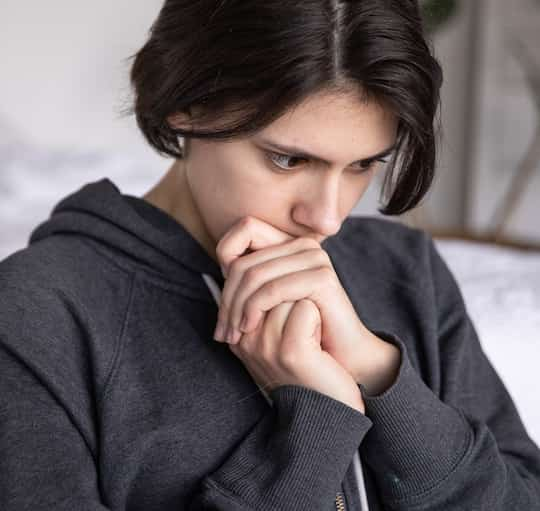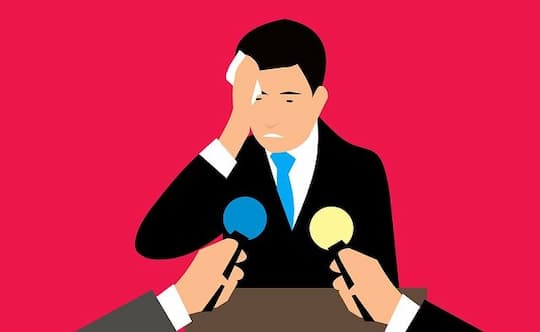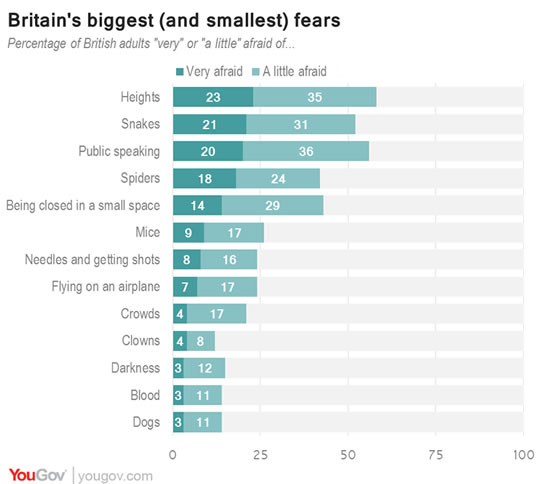Deal with anxiety and stress using ten techniques that psychological research has shown to be highly effective.
The best way to deal with anxiety and stress is, of course, to identify the source and get rid of it.
If only this were possible.
You can try to avoid people who stress you out, say ‘no’ to things you know will cause you anxiety and stress, and generally do less stuff.
Unfortunately, this is often out of the question or you would have already done it.
So, here are 19 techniques you can use to deal with anxiety and stress that you can’t avoid.
1. Develop awareness to deal with anxiety
This is the step most people skip.
Why? Because it feels like we already know the answer.
But sometimes the situations, physical signs and emotions that accompany anxiety aren’t as obvious in the moment.
Here are a few common symptoms of stress and anxiety:
- excessive sweating.
- dizziness.
- tension and muscle aches.
- tiredness.
- insomnia.
- trembling or shaking.
- a dry mouth.
- headaches.
So, try keeping a kind of ‘anxiety and stress journal’, whether real or virtual.
When do you feel anxious and stressed and what are those physical signs of anxiety?
When you can identify what’s stressing you out and how you react, you’ll know when to use the techniques below to deal with anxiety and stress.
2. Breathe to cope with anxiety
The mind and the body each feed back to the other.
Taking conscious control of breathing sends a message back to the mind and helps you deal with anxiety and stress.
So, when you’re anxious or stressed, which is often accompanied by shallow, quick breathing, try consciously changing it to relaxed breathing, which is usually slower and deeper.
You can count slowly while breathing in and out and try putting your hand on your stomach and feeling the breath moving in and out.
Research has shown that deep breathing helps people deal with anxiety and stress.
Diaphragmatic breathing — colloquially known as deep breathing — involves contracting the muscles underneath the lungs.
Sometimes it is called ‘belly breathing’ because it feels like breathing from the belly.
In contrast, ‘chest breathing’ — using the muscles around the upper body — is less efficient.
This sort of shallow breathing is linked to anxiety, fatigue and muscle tension.
Belly breathing is best done by breathing in steadily for four seconds from the diaphragm, then exhaling for six seconds.
3. Avoid venting emotions
Some of the ways we react to stress are built on false conceptions of how the mind works.
‘Venting’ — letting your emotions out in an angry, tearful and emotional rush — is a good example.
It’s commonly thought that emotions have to be ‘let out’ in order to reduce them.
This simply isn’t true and is not a good way to deal with anxiety or stress.
Venting emotions can actually cause them to become more powerful, rather than allowing them to subside or reduce.
None of this is to say that you shouldn’t talk to others about what is happening, it’s just that the form it takes shouldn’t be a blast of raw emotion.
4. Think differently to cope with anxiety
One way to deal with anxiety and stress is to change the way you think about stressors.
You can do this by reframing the stressful tasks you have to do.
For example, giving a presentation is stressful but, on the other hand, it’s a chance to demonstrate your expertise to others and to network.
One study on how to beat stress had bankers watching a ‘stress-is-enhancing’ video which suggested that some people do their best work under pressure.
For example, Captain “Sully” Sullenberger landed his stricken airliner on the Hudson River and Winston Churchill successfully led Britain through WWII.
Those who’d seen the ‘stress-is-enhancing’ video did develop a more positive stress mindset.
This led to them reporting better performance at work and fewer psychological problems over the subsequent two weeks.
In addition, thinking that stress is enhancing was associated with lower levels of cortisol, a hormone closely associated with the stress response.
In other words, people’s physiological reaction to stress and anxiety was better when they endorsed the idea that stress is enhancing.
5. Accept anxiety to deal with it
Sometimes, though, trying to find the upside of a stressful situation can be hard.
Some situations are what they are and there are no ways to fool yourself into thinking about them differently.
In that case it’s better just to accept the situation to cope with anxiety and stress, rather than fighting it.
Acceptance doesn’t mean it’s right, that you’re happy about it or that you ignore it.
It also doesn’t mean that you give up.
Rather it’s acceptance that something can’t be changed and it is wasted effort trying to work out how it can be changed, or how it could have been different.
6. Keep busy to handle anxiety
The problem with feeling anxious and stressed is that it makes you feel less motivated to engage with distracting activities.
When unoccupied, the mind tends to wander, often to anxieties.
One answer is to have a list of activities that you find enjoyable ready in advance.
When anxiety hits at an inactive moment, you can go off and do something to occupy your mind.
Try to have things on your list that you know you will enjoy and are easy to get started on.
(A word of caution: being too busy is not a good idea, you want to be occupied, but not creating even more anxiety and stress for yourself.)
7. Dealing with intrusive thoughts
Much of the everyday anxiety and stress we face results from unwanted intrusive thoughts going around in our heads.
They could run from things as simple as “Did I turn off the cooker?” up to persistent worries about the future.
There are a number of techniques to get rid of intrusive thoughts, here are a few:
- The worry period. Researchers have tried asking those with persistent anxious thoughts to postpone their worrying until a designated 30-minute ‘worry period’. Save up all your worrying for this time and it may ease your mind the rest of the time.
- Write about it. Writing about your deepest thoughts and feelings may help to reduce recurrent unwanted thoughts.
There are six more in this article on intrusive thoughts.
8. Muscle relaxation technique
The most common type of relaxation therapy which psychologist teach may be familiar to you.
It involves mentally going around the muscle groups in your body, first tensing then relaxing each one. It’s as simple as that.
And, with practice, it becomes easier to spot when you are becoming anxious and the muscles are becoming tense.
The next stage is to cut out the tensing phase and move straight to relaxing each muscle.
Next, you learn to associate a certain cue, say thinking ‘be calm’ with a relaxed state.
You then learn to relax really quickly.
Finally you practise your relaxation technique in real-world anxiety-provoking situations.
Read more about relaxation techniques for anxiety.
9. Exercise to cope with anxiety
One of the best ways to deal with anxiety and stress is to exercise.
Studies on mice, for example, have shown that exercise reorganises the brain so that it is more resistant to stress (Schoenfeld et al., 2013).
It does this by stopping the neurons firing in the regions of the brain thought to be important in the stress response (the ventral hippocampus).
Studies in humans show that exercise has a relatively long-lasting protective effect against anxiety (Smith, 2013).
Both low and medium intensity exercise have been shown to reduce anxiety.
However, those doing high intensity exercise are likely to experience the greatest reduction in anxiety, especially among women (Cox et al., 2004).
Exercise can reduce anxiety symptoms by 20 percent compared with those who do not exercise (Herring et al., 2010).
As little as 20 minutes can make you feel calmer right now — and it works on just about everybody.
More than around 30 minutes of exercise, though, seems to provide the best dose for anxiety.
Up to 80 percent of people experiencing depression say exercise improves their mood and anxiety most of the time, another study has found.
10. Sleep to combat anxiety
Stress and anxiety can lead to lost sleep.
So learn the most successful single intervention psychologists use to help people sleep well.
It is called Stimulus Control Therapy (Morin et al., 2006).
You’ll be happy to hear it consists of six very straightforward steps.
If you follow these, it should improve your sleep which, in turn, should help you deal with anxiety and stress.
Here they are: how to fall asleep fast.
11. Reframe anxiety-provoking situations
One of the best ways to deal with anxiety and stress is to think about situations differently.
Most situations can be re-framed and studies show that people who do this naturally — as opposed to trying to suppress their anxiety — feel less anxious in stressful social situations.
For example:
- It is not a scary presentation; it is a little chat with a few colleagues.
- It is not a job interview; it is a chance to meet some new people.
Reappraisal can be beneficial when anxiety becomes persistent and gets in the way of everyday life.
12. Safety signals to deal with anxiety
Using safety signals helps people to deal with anxiety and stress.
Safety signals can be anything from a picture linked to relaxing thoughts, to a piece of music or a place.
When in a situation that provokes anxiety, thinking about these safety signals can help.
Safety signals access a totally different network in the brain to those usually targeted by therapy or medication.
Therefore, they may help people who do not respond to other methods of treatment.
13. Lavender reduces anxiety
The smell of lavender can be effective to deal with anxiety and stress.
Lavender also has practically no side-effects in comparison to drugs like benzodiazepines and SSRI antidepressants.
Benzodiazepines, in particular, can cause headache, dizziness and an effect like being drunk.
Lavender, meanwhile, has a relatively quick relaxing influence and no other side-effects.
14. Improve gut bacteria
Improving gut bacteria decreases anxiety and helps people deal with anxiety and stress.
Both a balanced diet and using probiotics can help improve gut bacteria.
Foods that may help to improve gut bacteria include those high in fibre, such as vegetables, beans and legumes.
A diverse range of foods can also help many different types of ‘good’ bacteria grow in the gut.
It is better to avoid sugar, alcohol and artificial sweeteners as these can be detrimental to gut bacteria.
Prebiotics also improve gut bacteria.
15. Fruits and vegetables
Eating more fruits and vegetables lowers the risk of anxiety by almost one-quarter.
The study also found that anxiety disorders are more common in women, in those with low household income and those with other health problems.
Higher amounts of body fat were also linked to anxiety, Mr Jose Mora-Almanza, study co-author, said:
“This may also partly explain the findings associated with body composition measures.
As levels of total body fat increased beyond 36%, the likelihood of anxiety disorder was increased by more than 70%.”
16. Personality change
Two different types of psychotherapy for anxiety disorders can change people’s anxious personalities dramatically which helps them deal with anxiety.
The study included 60 patients with generalised anxiety disorder who received either cognitive-behavioural therapy (CBT) or metacognitive therapy.
Metacognitive therapy involves targeting basic thinking processes, in contrast to CBT which concentrates on the content of thoughts.
A simple example of metacognition is realising one is prone to repetitive thinking of depressive thoughts — what psychologists call rumination.
The results showed that just 12 sessions of psychotherapy was enough for people to make large changes to their personalities and improve their ability to deal with anxiety and stress.
17. Yoga to cope with anxiety
Yoga is an effective complementary way to deal with anxiety.
Yoga and breathing exercises reduce the symptoms of anxiety in both the short and long-term.
In fact, the more yoga practice people in the study did, the more their depression and anxiety improved.
Another study has also shown that practising yoga reduces the symptoms of generalised anxiety disorder.
18. Matcha tea
A type of green tea called matcha reduces anxiety.
Matcha green tea, which has a long history of medicinal use in Japan, has a calming effect, a mouse study has shown.
The tea has an active ingredient that stimulates both dopamine and serotonin receptors — both of which are linked to anxious behaviour.
Matcha comes in the form of a finely ground powder derived from the same small tree that all teas come from: camellia sinensis.
19. Therapy to deal with anxiety
Cognitive-behavioural therapy (CBT) is currently the best treatment for anxiety.
It is better than just taking drugs and better than taking drugs as well as having therapy.
Cognitive therapy results in either a cure or significant improvement in 85% of patients and online CBT is also effective.
It is probably the ultimate way to deal with anxiety.










